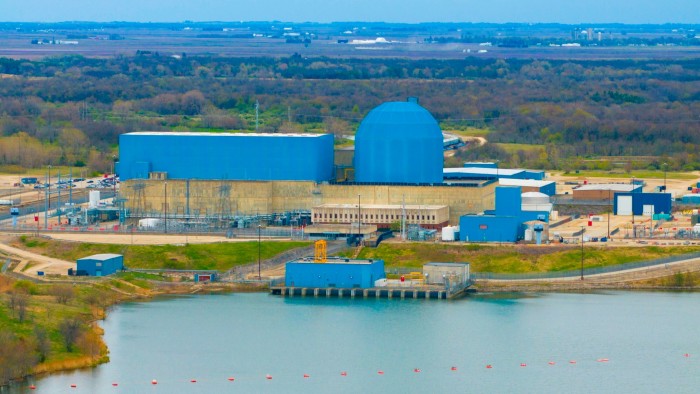Unlock the Editor’s Digest for free
Roula Khalaf, Editor of the FT, selects her favourite stories in this weekly newsletter.
Meta has agreed to buy the output of a nuclear plant in Illinois for two decades, marking its first deal of this kind as it seeks to shore up electricity to power its artificial intelligence efforts and US data centres.
The social media group said on Tuesday that it had signed a deal with Constellation Energy, the operator of the largest fleet of conventional nuclear reactors in the US, to purchase the output of the Clinton Clean Energy Center for the 20 years from June 2027. The agreement will help extend the life of the facility beyond a deadline for the expiry of state government subsidies.
Big Tech companies are racing to secure the vast amounts of electricity that are expected to be needed to meet soaring demand stemming from the AI boom, prompting those companies — and utilities — to also consider power generation options beyond traditional fossil fuels.
The deal comes as Meta chief executive Mark Zuckerberg has been pouring billions of dollars into developing AI models and products for the platform in a bid to become the “AI leader”.
Meta’s rivals Amazon, Google and Microsoft had all struck deals with nuclear power plant operators recently, but plans by the social platform for a similar deal last year were upended by environmental and regulatory challenges, the Financial Times reported. Among them, Zuckerberg told staff that the discovery of a rare bee species on a location next to the plant where a potential data centre was to be built had complicated the project.
Constellation last September announced it would reopen its Three Mile Island nuclear plant in Pennsylvania after agreeing a 20-year power supply deal with Microsoft. One of the plant’s units was closed in 1979 after a partial meltdown that led to the most serious nuclear accident in US history. In Meta’s case, Clinton is already in operation.
In a further boost for the prospects of the US nuclear sector, President Donald Trump last month signed an executive order to fast-track construction of reactors, as well as helping finance power upgrades to existing reactors, in an effort to quadruple the country’s atomic energy capacity by 2050.
Earlier this year, Constellation announced a nearly $27bn deal to buy rival Calpine in a tie-up of two of the country’s biggest power generators amid the projected surge in demand for electricity spurred by the AI boom.
Financial details of the Clinton deal were not disclosed. Constellation said in a statement that the agreement with Meta would enable it to reapply for federal relicensing and the continued operation of the plant, which is located in the centre of the state, about 250km south-west of Chicago.
Constellation also said the partnership would expand Clinton’s clean energy output by 30 megawatts, as well as preserve 1,100 “high-paying local jobs” and generate $13.5mn in annual tax revenue.
The lossmaking Clinton plant was scheduled for closure in 2017, but was kept going due to the enactment of Illinois state legislature that provided financial support until mid-2027. Meta’s involvement will pick up where the government subsidies would have expired, allowing the operation of the facility without the support of ratepayers.
Constellation chief executive Joe Dominguez said the company was “proud” to partner with Meta because “they figured out that supporting the relicensing and expansion of existing plants is just as impactful as finding new sources of energy”.
Shares in Constellation were up about 6 per cent shortly after Wall Street’s opening bell on Tuesday, while Meta rose 0.1 per cent.
Other nuclear stocks were buoyed by news of Constellation’s partnership. Shares in Oklo, the small modular reactor developer backed by OpenAI chief executive Sam Altman, rose 9 per cent. while reactor designer NuScale Power rose 8 per cent. Centrus Energy, a nuclear fuel company, rose 7.5 per cent.
